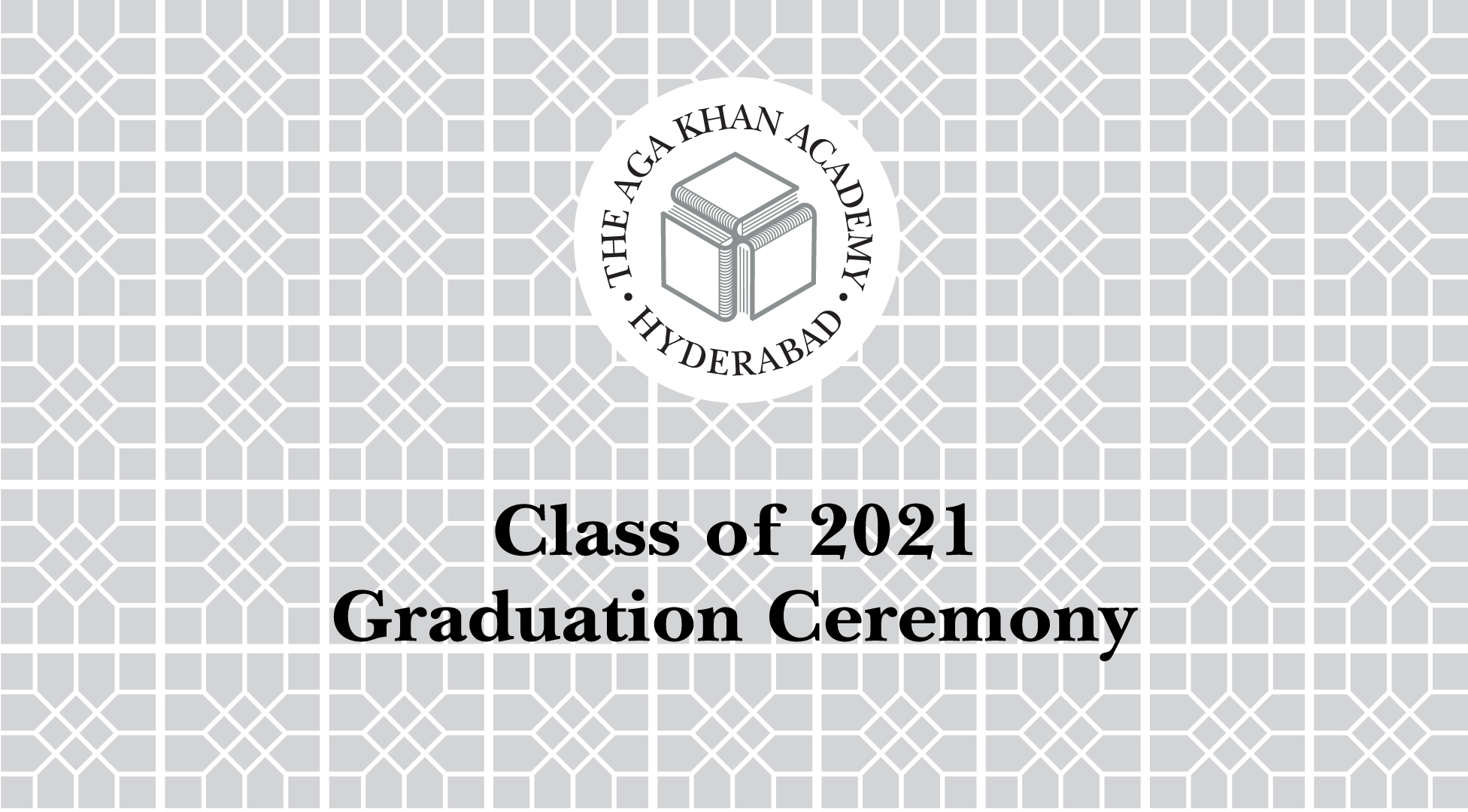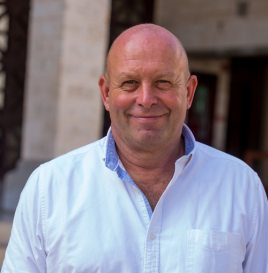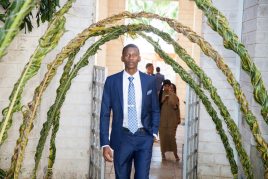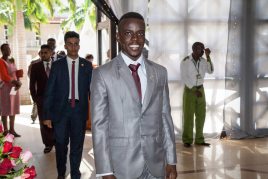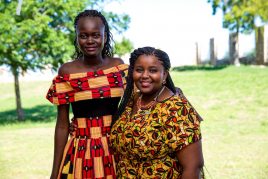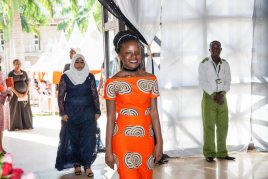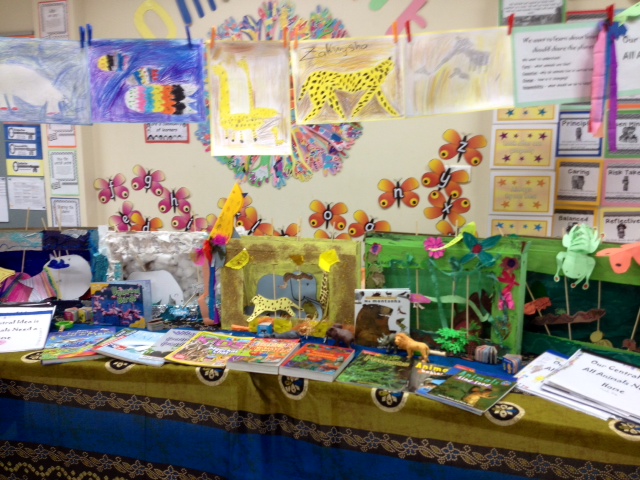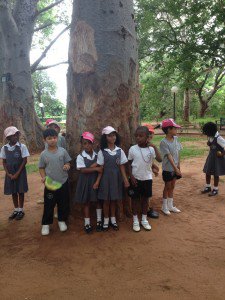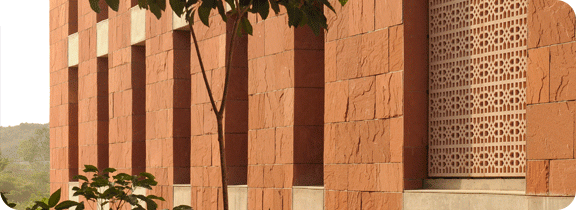
Quick Facts About the Academy
The Aga Khan Academy Hyderabad (established 2011)
Location: South of the city of Hyderabad, near the Rajiv Gandhi International Airport
Campus size: 100 acres of land allocated by the state government
Campus design and construction:
- total built area: approximately 500,000 square feet
- master facilities planners for the Academies: Sasaki Associates Inc. of Boston, USA
- campus design: award-winning architect Bimal Patel of HCP in Ahmedabad, India
- campus construction: Shahpoorji Pallonji
Curriculum
The Aga Khan Academy Hyderabad is an International Baccalaureate (IB) World School
IB programmes:
- Primary Years Programme: grades 1–5;
- Middle Years Programme: grades 6–10;
- Diploma Programme: grades 11–12
Aga Khan Curricular Strands, implemented across the curriculum:
Ethics, Pluralism, Cultures (with an emphasis on Muslim civlisations), Governance and Civil Society, and Economics for Development
Staff and students
Faculty numbers: 8 senior management, 63 Senior School faculty, 19 Junior School faculty, 7 working in both Senior & Junior Schools, 42 administrative staff
Number of students currently enrolled: 632 day and residential students in total: 140 day students in the Junior School; 492 students in the Senior School, with 245 in residence
Numbers of students and teachers at full capacity: 750 students and 90 teachers, with over 40% of students receiving some form of financial aid
First IB Diploma Programme graduating class: 2014
Residential students
Number of residential students: 245 currently, with full capacity of 300 students
Number of students per room: Between 2 and 4, with second year Diploma Programme students in single/double rooms
Residential facilities: Student lounge with multimedia and entertainment equipment, study areas, laundry facilities, dining hall
Campus facilities
Sports facilities: 25-metre swimming pool, diving pool, gym, two regulation-sized basketball courts, three cricket pitches with net practice facilities, two tennis courts, four squash courts, athletics track, junior play area, hockey field, training field, 2.5 km cross-country track
Arts facilities: Rooms for fine arts, music, dance; individual music practice booths; music recording area; amphitheatre performance space
Academic areas: Junior School classrooms, Senior School classrooms, science and computer laboratories, library and resource centre, arts facilities, music and dance studios
Residential buildings: 6 residential blocks: 3 male and 3 female; 6 dorm parent apartments in each block. Each block has a central atrium, lounge area, patio and laundry facilities.
Health and Wellness Centre: 12 beds and a full-time, qualified nurse
Professional Development Centre
The Aga Khan Academy Hyderabad is home to a Professional Development Centre for the advancement of teachers. The primary objective of this centre is to provide professional development that will benefit the wider school system in India.
Programming began in June 2010 with a Professional Learning for Educators Series for teachers in local government, independent and not-for profit schools.
The Aga Khan Academies network
18 Academies are planned in Africa, South and Central Asia, and the Middle East.
3 Academies are currently operating: Mombasa, Kenya (opened 2003); Hyderabad, India (opened 2011); and Maputo, Mozambique (opened 2013).
When complete, the network will represent 2,000 teachers and 14,000 students (boys and girls), with 1,400 graduates annually.
Institutional partnerships include:
Agencies of the Aga Khan Development Network; the International Baccalaureate, universities including the University of British Columbia, Concordia University, Ryerson University, University of California - Los Angeles, California State University - Northridge
Government partnerships include:
The Province of Ontario, Canada; the Ministry of Education, Science and Technology, Kenya; the Ministry of Education and Human Development, Mozambique; the French Development Agency (AFD); the French Mozambican Cultural Centre (CCFM - Centro Cultural Franco-Mozambicano); the Department of School Education, Telangana, India
Download the Quick Facts sheet here. ![]() AKA-Hyderabad-Quick-Facts.pdf
AKA-Hyderabad-Quick-Facts.pdf
Graduation 2021
We look forward to celebrating the Class of 2021 Graduation with you on 22 May 2021 at 11am IST.
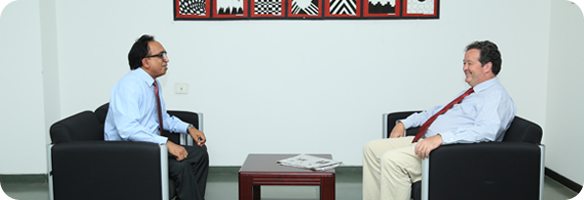
Policies & Procedures
The following policies are available at the Academy's administrative office.
- Academic Honesty Policy
- Assessment Policy
- International Baccalaureate Rules and General Regulations*
- Language Policy
- Personalised Learning Policy
* Copies can also be found on the International Baccalaureate website.
Parents are invited to contact the Academy if they would like to receive a copy of any of the above documents.
The Aga Khan Academy Hyderabad
Survey No: 1/1, Hardware Park
Maheshwaram Mandal, R.R. District
Hyderabad 501 510
Telangana, India
+91-40-66291313
+91-40-66291310
(Switchboard number/general enquiries)
or
Write to the Aga Khan Academy Hyderabad (online form)
Newsletters
The Aga Khan Academies periodically send out an email newsletter to share updates and articles of interest with friends of the Academies. If you would like to receive the newsletter, please visit the Aga Khan Academies newsletter page to sign up and view archived issues.
Aga Khan Academy Hyderabad newsletters
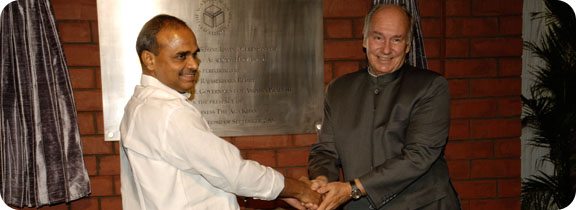
History
In 2000, His Highness the Aga Khan initiated a programme to establish an integrated network of schools, known as the Aga Khan Academies. The aim of the Academies is to provide education to deserving students at an international standard of excellence.
The Aga Khan Academies are part of the Aga Khan Development Network (AKDN), which has been involved in education in developing countries for decades. AKDN agencies currently run more than 240 schools and educational programmes ranging from early childhood through to post-graduate education.
In 2003 the first Academy was established in the Kizingo area of Mombasa, Kenya. A facility inspired by Swahili architecture, the Aga Khan Academy Mombasa is a state-of-the-art learning institution. It is recognised as an International Baccalaureate World School. The Aga Khan Academy Hyderabad was the second to open in 2011, and the third opened in 2013 in Maputo, Mozambique.
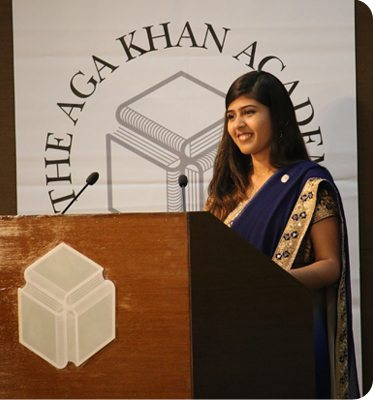 Establishment of the Aga Khan Academy Hyderabad
Establishment of the Aga Khan Academy Hyderabad
Construction of the Aga Khan Academy in Hyderabad began in 2006. The first intake of students was in August 2011 for the Junior School and 2012 for the Senior School, including the residential programme. The Academy has been accredited as an International Baccalaureate World School for the Primary Years, Middle Years and Diploma Programmes. The first class of the Senior School’s Diploma Programme graduated in 2014.
The Academy's Professional Development Centre (PDC) began operating in July 2010, prior to the opening of the school. The first programme offered by the PDC was a series on Professional Learning for Educators. These are collaborative courses designed by the Aga Khan Academies with input from government and educational experts. Their aim is to improve the education of both students and teachers within the region.
A global learning community
As further Aga Khan Academies are established, the vision is for them to become an interconnected network of schools that form a global learning community. The work of the Academies is also enhanced through partnerships with other educational institutions and the agencies of the Aga Khan Development Network.
Rajan Thampi: Working for a cause
Rajan has played this role of connecting students to resources for his entire career. His work with Aga Khan Education Services began in 2008 in Maheshwaram Mandal, present day Telangana, where he implemented outreach programs for government schools and anganwadis. Rajan was in charge of programs like introducing life skills to high schoolers, leading health programs for adolescent girls, organising inter school sports competitions, and also training teachers for pre-primary and primary schools. Rajan’s other responsibility at that time, something he is still involved in, is creating and maintaining relationships with government officials.
A significant part of outreach depends on securing permission and getting recognition from government education bodies. Rajan played a major role in getting junior and senior schools recognised by the authorities. Rajan thanks the people who support the outreach department in these endeavors - the Academies Unit and members of the local board, Suleiman Hirani and Jayanthi.
Born in Kerala, the second of five siblings, Rajan grew up in Shakkarnagar, Telangana. Shakkarnagar is home to historical industrial era sites built under the Nizam. Most significant among these sites is the 1,600 square kilometer Nizam Sugar Factory that the town gets its name from. Designed as a model town, the place was built for factory employees and their families. “My father was an accountant in the factory,” remembers Rajan, “and we use to live in the accommodation provided by the factory in its colony.” Madhu Malancha high school, where Rajan went, was also created and funded by the factory. But India’s sugar trade has been in decline for decades, and in his lifetime Rajan has had to see the closure and privatisation of the massive factory. “Asia’s largest sugar factory is now shut,” he muses.
After completing senior school, Rajan gained a Bachelors in Commerce and started teaching at a private school. Finding his calling, Rajan then pursued a Bachelors in Education, focusing on social studies and education. Today he also has a Masters degree in social work under his belt. To Rajan, these degrees are tools to help others. Asked about the outreach department's future plans, his responses are ambitious and focused. “Reaching out to 31 districts of Telangana,” he says, “and to continue to share expertise through collaborative discussion forums for the government teachers are some of my plans.”
“Inner delight,” he says, “and the satisfaction obtained from working for a cause are the rewards I seek from my work." If the outreach program is a manifestation of the ethos behind service and stewardship, then Rajan exemplifies those ethos.
Inaara Sarfani (Class of 2016): Valuing personal development
The time I spent at the Aga Khan Academy Hyderabad helped me become the person I am today. The Academy served as a platform for me to develop my self-expression, confidence, balance, service and reflective ability. The Academy provided a prestigious curriculum through the International Baccalaureate (IB) which exposed me to a unique style of education that equally emphasised academics and extracurriculars. Through teamwork, both in classes and service projects, I built collaboration as well as communication skills. To be honest, there is nothing that has not helped me adapt to university life from the time I spent at the Academy and I identify the most with the ability to reflect.
Prior to joining the Academy, I was an introvert who kept to herself and preferred the company of people I knew. Studying at the Academy was first step out of my comfort zone, as I had to make new friends with the people I would share my classes with for the upcoming four years before graduation and university. For a person as shy as I was, it sounded terrifying but I was willing to take risks to receive quality education and learn skills that would help me in the future. Apart from the rigorous academics that kept students on their toes, the service projects and athletic events fostered a close relationship between students. I was a part of the service project that went to a government school for girls (Kasturba Gandhi Balika Vidyalaya) and undertook the responsibility to improve their conversation skills in English along with imparting news of global events among them. Working with classmates, devising plans, organising meetings and keeping track of the students’ progress were some of the tasks that helped me understand my classmates further as we worked together to create positive changes in people’s lives. In this endeavour, tracking the progress of these students foreshadowed the importance evaluation and reflection would have in my life.
There was also a part of me that wanted to achieve something valuable; to me, this meant two things: true recognition and establishing relationships I would continue in the future. I was fortunate to achieve both of these by being a part of the Academy. I received recognition for my hard work and the faith my teachers, my career advisor and my parents put in me was rewarded when I received the Ontario Tuition Waiver. I have developed a close communication network with people I met at the Academy.
I integrated the qualities I learnt at the Academy into university life by participating in various extracurriculars. I have volunteered at the women’s centre who provide a supportive atmosphere to people regardless of their gender and currently a member of the Marketing Advisory Board and Residence Promotion Team for on-campus residences. Being a part of these teams required me to communicate effectively as well as form good relationships with my teammates; skills that I learnt at the Academy, proving useful.
I am currently planning to minor in human resource management and explore this field along with psychology. I plan to be open to experiences that will come along the way. Looking back on my time spent at the Academy, I cherish the small yet meaningful moments, such as going for service projects with friends and engaging history classes. I can see the introvert girl trying to fit in with a group of equally new students starting their first day at the Academy; I also see that same girl receiving the scholarship and realising the potential she always had. The transition to university would not have been easy if it were not for the time I spent at the Aga Khan Academy Hyderabad.
By Inaara Sarfani
Talent Identification Students: Creators of destiny
One of the great African presidents, Julius Nyerere, once said that the point of education was to turn creatures of destiny into creators of destiny. As the Dean of Admissions and Financial Aid at the Aga Khan Academy Mombasa, I have passionately led a Talent Identification Programme for nearly ten years now. The programme identifies “creators of destiny”, students in Year 6 in Kenyan government schools, in deprived socio-economic and educational areas of Kenya, who are academically able and show leadership potential. This May, seven of these students have fulfilled part of their destiny, in graduating from the IB Diploma Programme. Six of these seven students have secured a path to their next destination in life, by gaining access to some of the best universities in the world, on full scholarships. The Academy has guided and nurtured the students to have the confidence to become “creators of destiny”. The vision of His Highness the Aga Khan is that these students, as well as other members of the 2018 graduating class, will go out and be creators of change in their own communities.
As a teacher, the idea of educating a child for profit has always repelled me. The Academy’s inclusive culture was one of the factors that appealed to me when I first applied for the post at the school, as was the opportunity to lead the Talent Identification Programme. (Coming from a very working class background myself, I know that my parents would never have afforded me the opportunity to gain access to a secondary or higher education, without the assistance of the state system in the United Kingdom). From the outset, I can honestly say that not all teachers were supportive of bringing these students into the school’s residential programme. I did have a picture in my mind of how successful this could be from my work at previous schools, but I must admit, I did have sleepless nights about the scale, severity and scope of it all.
The assessment process in identifying these students has evolved and refined over the years. One very important aspect of innate leadership that is assessed is that of inferential thinking, the ability to make connections across different areas of knowledge. From this graduating cohort, I always remember one of the students exhibited exceptional ability in this area. Japheth Otieno, at the age of 11 then, referred to the inter-relation between governments causing difficulties in a problem solving activity when he mentioned, “Imagine that a Country A is helping Kenya with aid and money. Imagine that another Country B is an enemy of Kenya. Conflict may arise between Countries A and B, as there is suspicion over the reasons for this assistance to Kenya.” In the selection interviews, we look for students who are likely to question their world, have a keen sense of justice and morality, have good verbal communication skills and a sense of extra-curricular involvement. Japheth impressed me with his references to whether there was a multi-level universe or not and his passion for his kitchen garden, where he had initiated some preventative measures for protecting his plants. Japheth has now secured a place with the King-Morgridge Scholarship at the University of Wisconsin Madison in the United States.
I am delighted that this cohort sees the first student from the Ganze area, William Baya, graduating. I remember meeting William for the first time in 2011. At that time, the Kilifi County Governor reported widespread hunger in some parts of the county, especially for families living in the semi-arid areas. Learning in hundreds of primary schools in hunger-stricken parts of the country had been paralysed as the government dispatched emergency relief supplies. It was against this backdrop that we first met William, then a student at Vitengeni Primary School. William had already showed some leadership traits with him being involved as a scout commander and a school prefect. His school felt that he was a responsible and determined pupil. He mentioned about working hard in life so that he could target his goals – his motto at that time was “front ever, back never”. The self-drive William displays from adhering to this motto has guided him through the six years at the school and given him a full scholarship to attend Washington and Lee University in the United States. On learning of this, his father beaming with great pride said, “The Aga Khan Academy Mombasa has transformed my boy and that I am looking forward to him to come back and work for the community to repay the Aga Khan's contribution.”
One unique aspect of the Aga Khan Academy Mombasa, is its double heritage of world-mindedness and its proud East African identity. Since the inception of the school in 2003, Swahili has been compulsory for all students up to 14 years of age. His Highness recognised the need for young leaders to be able to communicate in their national language with other members of their community. (It is interesting to note that other non-national schools have only recently introduced Swahili into the curriculum for all students after a recent government directive). The Academy is at the forefront of academic thinking and is always forward thinking.
The development of the students in the school to “creators of destiny” is by no means left to chance. From this double heritage foundation, important concepts such as those of meritocracy, pluralism, ethics and other virtues and attributes that make up the students’ learner profile, have been integrated into all aspects of the curriculum. The students are allowed to run the risk, among other things, of failure because the privation of not succeeding can be an excellent teacher. Students are also given responsibility so that they can experience and learn from taking leadership roles. This is encouraged in every student. The students take charge in aspects of enrichment, academics and service, so that they are held accountable and answerable for their decisions, both when they get it right and when they fail.
Prudence Hainga after graduating this year will join the University of Edinburgh to study Political Science. Prudence reflected on what this scholarship meant to her and her community. “I want to realise my childhood dream of fighting injustice and corruption in Kenya. Having experienced and witnessed different levels of inequality in my country, I want to delve into a career path that will help me change what has become a detrimental routine in my country. The Kenyan political system is majorly defined by tribalism and inequality. Therefore, learning how political systems function and what others have done to ensure sustainable development as well as spread out opportunities for their citizens, will help me to decipher ways in which I could impact change in my country’s political system and rid Kenya of tribalism and greed. I am motivated to use my knowledge as a weapon against discrimination and inequality and work for a better Kenya – a Kenya that feels like home to all.”
These young men and women who have benefited from this progamme, did not have a great deal when they first came to the Academy, and their future was continually uncertain, with parents struggling to secure jobs, keep food on the table as well as educating their children. To see them grow and nurture and fulfil what was expected of them at this moment in time brings a lot of satisfaction. I have taught in many schools throughout the world, but there is something unique and special about this graduating class and other students at the school. The school recently had a visit from the representative from the International Baccalaureate Organization. On commenting on the school the one thing that stood out in my mind was his reference to the children here. He simply said that the children were “staggering”. These staggering students are helping to fulfil our mission for the Aga Khan Academy Mombasa that fits with building a better Kenya.
By Paul Davis
